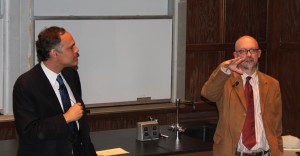The audio and video “sting operations” by Live Action that exposed Planned Parenthood clinics have spurred controversy about lying. Such a controversy led Catholic Studies master’s program students to chose the question, “Can It Be Morally Permissible to Assert a Falsehood in Service of a Good Cause?” for its Easter Disputation.
Visiting professors of philosophy Christopher Tollefsen and Christopher Kaczor spoke at the disputation Thursday, May 5, in the John Roach Center auditorium.
Both philosophers presented their arguments regarding the morality of lying and responded to each other’s comments.

Tollefsen based his arguments from the standpoints of St. Augustine and St. Thomas Aquinas, who believe all lies are wrong.
“It’s rooted in [Augustine’s] view that God is truth,” Tollefsen said. “And in consequence, I think lying … cuts against our need to respond through Christ precisely as truth.”
Tollefsen said lying is contrary to the truth and is self-defeating for three reasons: lying gives bad witness when the goal is the truth, lying leads to more lying and lying is a form of evil.
“Anything that’s contrary to truth for Augustine just seems like it can’t possibly be compatible with Christianity,” Tollefsen said. “If we’re Augustinian in this respect, we should be disturbed by something that potentially does cut across … this very deep aspect of Christianity.”
Tollefsen included Aquinas’ belief in a certain order of communication. He believes truth, the ability to love and a person’s integrity all come from the order of disclosure within communication. Tollefsen said lying disrupts the order of communication.
“[Lying] gives bad witness to something that is grounded in truth,” Tollefsen said. “The pro-life position is grounded in truth.”
Tollefsen said lying is inadequate because it’s at odds with the need for a culture to believe the truth.
Kaczor agreed with Tollefsen that there are certain things one shouldn’t do no matter the consequences.
Kaczor emphasized the importance of defining a lie. He referred to the second edition of the catechism of the Catholic Church as an example.
“According to this definition, a false assertion for a good cause may be permissible, so long as there is no intention of deceiving,” Kaczor said.
He also said that one act could be considered intrinsically evil to one person, but permissible to another. Kaczor also pointed out that it is possible for someone to lie occasionally and not have trust completely destroyed.
“False assertion creates personal disintegration between the inner self and the outer self that is presented to others,” Kaczor said. “But I’m not sure that this lack of unity or this lack of integration is intrinsically evil.”
Junior Liz McHale agreed with Kaczor’s statement.
“I probably more align with the idea that you could lie and it would be morally permissible,” Mchale said. “It seems tough to say that lying … is as equally wrong as killing somebody.”
Tollefsen and Kaczor are both anti-abortion. Tollefsen is a philosophy professor at the University of South Carolina and co-authored the book “Embryo: A Defense of Human Life.” Kaczor is a professor at Loyola Marymount University and wrote the book “The Ethics of Abortion: Women’s Rights, Human Life, and the Question of Justice.”
Rachel Britton can reached at brit7192@stthomas.edu.

I’m interested. Is it your theory then, that the stings on Planned Parenthood were false?